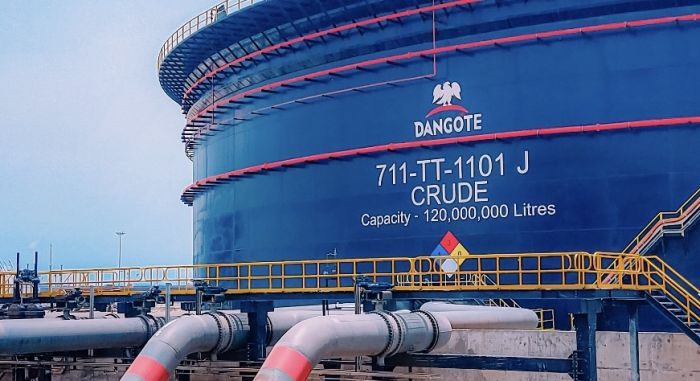The Dangote Petroleum Refinery is expected to raise its operational refining capacity to 700,000 barrels per day by December 2025. This anticipated increase follows continued expansion and optimization efforts within the massive facility located in the Lekki Free Trade Zone, Lagos State. The development marks a new milestone for the refinery, which has already begun supplying diesel and aviation fuel to the Nigerian market.
According to sources within the refinery, the target to reach 700,000 barrels per day represents an upgrade from the original installed capacity of 650,000 barrels per day. The ramp-up is being made possible by adjustments to key processing units and efficiency improvements in fuel conversion operations.

Several components of the refinery, including the Residue Fluid Catalytic Cracking (RFCC) unit and other distillation sections, are reportedly operating at near-maximum levels. The RFCC, which plays a critical role in converting heavier fractions of crude oil into valuable petroleum products, has achieved output levels exceeding 80% of its design capacity. Engineers working on the site have expressed confidence that full optimization will be completed before the end of the year.
The refinery commenced partial operations in early 2024, and by mid-2025, it had reached throughput levels of over 500,000 barrels per day. The facility began releasing diesel into the Nigerian market earlier this year, followed by aviation fuel. Gasoline production also commenced recently, though it is being scaled in phases pending completion of additional infrastructure and testing.
To sustain refining activities at these levels, the refinery has been relying on both local and imported crude oil. It is estimated that a significant portion of the feedstock currently being refined is sourced from international markets, especially due to supply bottlenecks with local producers. The refinery has therefore continued to call on Nigerian crude suppliers, including the national oil company, to ensure a steady flow of domestic feedstock to support local production and reduce reliance on imports.
The push to increase production capacity comes amid growing local demand for refined petroleum products. Nigeria, which has historically depended on imports to meet domestic fuel needs, sees the Dangote Refinery as a long-awaited solution to its refining deficit. When fully operational, the facility is expected to meet all of Nigeria’s refined product demand and provide surplus for export to neighboring countries.
Industry stakeholders have commended the refinery’s progress and its potential to transform the country’s energy landscape. Some petroleum marketers and trade associations have indicated that the steady release of products from the facility has helped to stabilize prices and reduce product scarcity, especially in recent months.
Despite its progress, the refinery faces challenges, including fluctuating foreign exchange rates and the need for continued coordination with government agencies to streamline supply chains. There are also ongoing efforts to align the refinery’s product quality with international standards to enhance export potential to markets in West Africa and beyond.
Meanwhile, regulatory authorities have reinforced the need for upstream producers to prioritize domestic supply obligations. This is seen as part of a broader strategy to support local refining operations and reduce capital flight through petroleum product imports. The Dangote Refinery is one of the main beneficiaries of this policy, as it requires a consistent volume of crude to sustain its daily operations and expansion plans.
Aliko Dangote, the founder of the Dangote Group, has repeatedly emphasized that the refinery is not just a business venture but a national asset with the capacity to positively impact the economy, create jobs, and drive industrial growth. He noted that the project’s scale and ambition are in line with Nigeria’s long-term energy security goals.
The final phase of the refinery’s commissioning is expected to be completed in the last quarter of 2025. With production capacity projected to reach 700,000 barrels per day by then, the Dangote Refinery is poised to become not only the largest in Africa but also one of the most sophisticated in the world. This development, if realized on schedule, will mark a major turning point for Nigeria’s oil and gas sector.
Support InfoStride News' Credible Journalism: Only credible journalism can guarantee a fair, accountable and transparent society, including democracy and government. It involves a lot of efforts and money. We need your support. Click here to Donate
